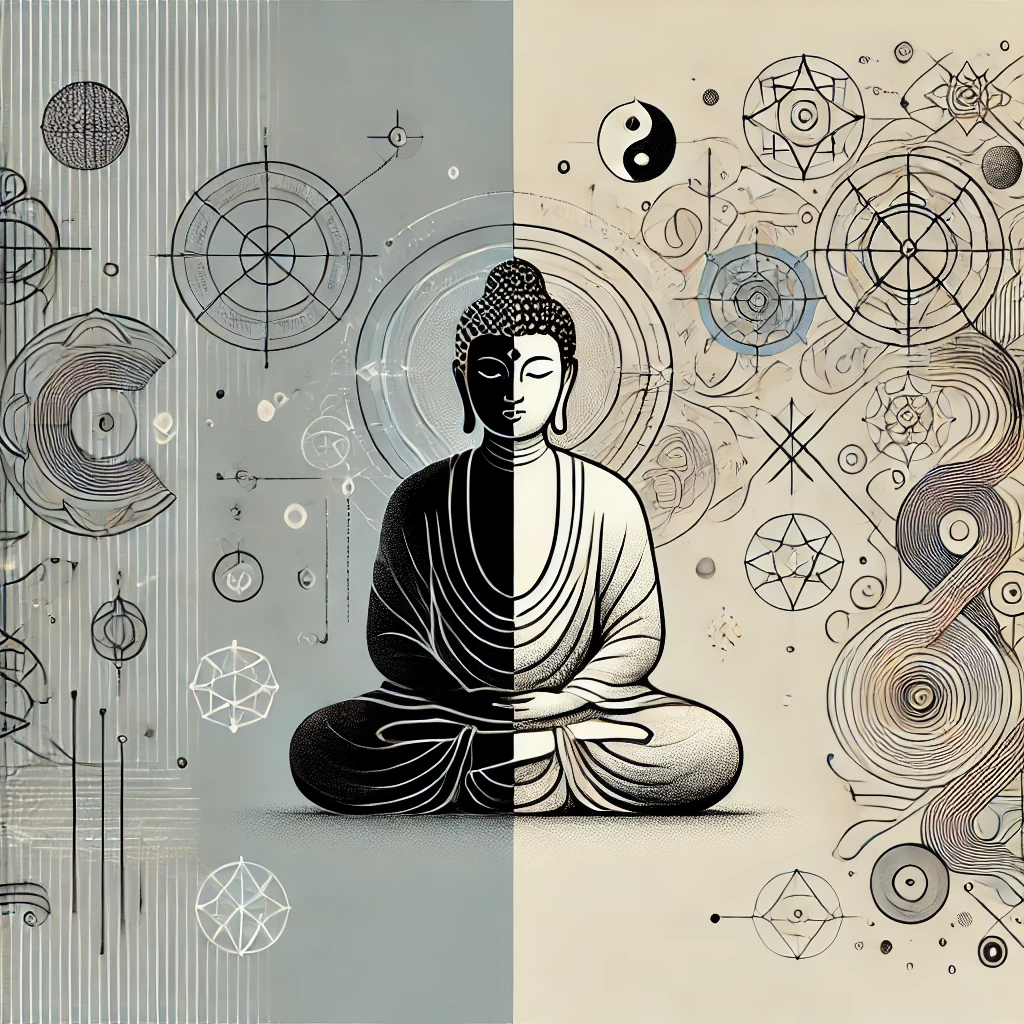Today, I’m addressing a topic that is somewhat different in focus from what you usually know from me. This is not a typical essay, but rather my expression of opinion on the subject of esotericism.
I am a Buddhist. As you can gather from many of my essays and works, I explore themes related to spirituality, Buddhism, meditation, music, and their effects on humans in terms of neurological and psychological aspects. I maintain a considerable distance from charlatans and esotericism and engage with the scientific community, read scientific studies, and work on material (as an author or co-author), etc. In this essay, I will explain why I maintain this distance.
You know Buddhism as a significant spiritual tradition in the world. Unfortunately, esotericism, which has gained increasing popularity in recent decades, fundamentally contradicts this tradition. While Buddhism has a long history of self-transcendence and communal growth, esotericism is characterized by individually tinted teachings that often pursue commercial motives.
Buddhism is considered profound and scientifically grounded (think of the countless scientific studies on the central Buddhist element of meditation), while esotericism is often associated with superficiality and money-making. For meditation (or feel free to call it “inner reflection”), you fundamentally only need yourself and your environment.
Enlightenment vs. Personal Benefits
What is Buddhism really about? Well, at the center of Buddhist teachings is enlightenment, the liberation from suffering through the overcoming of the ego. This requires discipline, self-reflection, and letting go of material desires. It is about developing wisdom and compassion to lead a life in harmony with other beings and the world. The practice of meditation, a central component of the Buddhist path, has gained increasing attention in Western science in recent decades. Studies have shown that meditation, especially mindfulness meditation (Vipassana), demonstrably changes the brain, reduces stress, strengthens the immune system, and improves emotional resilience. These scientific results confirm the profound impact of Buddhist practices and show that Buddhism, in many respects, is more than mere dogma—it is a method for direct experience and insight, supported by scientific investigations.
Esotericism, on the other hand, focuses on promises of personal benefits—whether through the acquisition of supposed spiritual abilities, healing diseases through unproven methods, or even alleged access to wealth and power. These promises appeal to the ego, whereas Buddhism seeks to overcome the ego. Moreover, many of these esoteric offerings are not only scientifically unfounded but also target purely commercial interests. Esotericism thrives on marketing its teachings and promises, and its practices often come with significant costs—whether for seminars, books, or personal sessions. Pure money-making… Additionally, there are people in difficult life situations who seek something meaningful in esotericism, who have important life questions, etc., which makes the commercialization all the more reprehensible to me.
Tradition and Teaching vs. Individual Interpretation
Buddhism relies on a millennia-old tradition based on the teachings of the historical Buddha. These teachings have been carefully preserved and passed down through generations, with the essence of practice—the letting go of the ego and the cultivation of compassion and wisdom—always at the forefront. The clear ethical framework and the transmitted writings provide a stable foundation for practice, supported by the experiences of many generations.
In contrast, esoteric teachings are syncretic, meaning they mix elements from different spiritual traditions and offer only a subjective, individually tinted approach. This lack of consistency and depth leads to a dilution of the original teachings, replaced by personal interpretations and commercial interests. The result is a patchwork of practices that are not based on authentic spiritual knowledge but are tailored to individual needs and market demands. Buddhism, with its clear structure and methodical practice, resists such subjective approaches as it focuses on demonstrable inner transformation rather than merely fulfilling individual desires.
Community vs. Individualism
Buddhism emphasizes the importance of the Sangha, the spiritual community, as an essential part of the path to enlightenment. The Sangha offers support, exchange, and clear guidance, accompanying practitioners in their quest for wisdom and ethical action. The communal aspect of Buddhism underscores that enlightenment is not only a personal experience but is also attained in connection with others.
Esotericism, on the other hand, tends to promote individualism. Individual experiences and personal encounters take center stage, while communal structures or established teaching traditions are often absent. This isolation of the individual increases the risk that spiritual practices become ego-centric rather than directed toward the community and the well-being of all beings. Furthermore, this individualism in esotericism often leads to a sense of superiority, as esoteric practitioners consider themselves “enlightened” or “initiated,” while neglecting the grounded practice and ethics of Buddhism.
Ethics vs. Personal Power
A fundamental aspect of Buddhism is its ethical orientation. Non-violence, truthfulness, and striving for the well-being of all beings are inseparable parts of Buddhist practice. This ethical foundation is not merely a theoretical concept but a practical necessity for spiritual growth.
In esotericism, however, the acquisition of personal power is often placed at the forefront, whether through magical rituals, visualizations, or other practices. This pursuit of power can easily lead to ego-centric or even harmful actions. The ethical reflection that is indispensable in Buddhism is often neglected or entirely ignored in esotericism. This further exacerbates the discrepancy between the two approaches and highlights why it is essential to distinguish oneself from such esoteric teachings.
Scientific Foundation vs. Belief in the Supernatural
While Buddhism, despite its mystical elements, promotes scientific thinking and the verification of experiences through practice, esotericism relies on supernatural phenomena that are scientifically unprovable or disproven. Meditation and mindfulness techniques, which are central components of Buddhism, have been studied in numerous scientific studies. Their positive effects on physical and mental health are well-documented and recognized. This clearly demonstrates that Buddhist practices have real and measurable benefits that go beyond mere belief.
Esoteric practices, on the other hand, lack scientific grounding. They are based on belief in supernatural powers, unproven healing methods, and illogical assumptions that do not withstand empirical scrutiny. This incompatibility with science is another reason why esotericism cannot be considered a serious spiritual tradition. It relies on the desire for quick, magical solutions without the hard work and ethical discipline that Buddhism demands.
Commercialization and Cultural Appropriation
A particularly problematic aspect of esotericism is its commercialization. Spiritual practices are sold as products in many esoteric movements, whether through expensive courses, books, seminars, or personal consultations. The high costs often associated with esoteric offerings raise the question of whether the true purpose of spiritual teachings has been supplanted by financial interests. This commercial exploitation of spiritual practices stands in direct contradiction to the Buddhist ideals of modesty and letting go of material attachments.
Additionally, esotericism tends to extract symbols and practices from Buddhism and superficially use them for its own purposes. This cultural appropriation not only devalues the Buddhist tradition but also distorts its profound wisdom. Esotericism reduces spiritual symbols to decorative elements and neglects their deeper meaning and context.
Summary
Buddhism and esotericism stand in fundamental opposition. While Buddhism is based on millennia of wisdom, ethical practice, and scientifically grounded meditation, esotericism relies on subjective, commercialized, and scientifically refuted notions. Buddhism strives for the overcoming of the ego and the cultivation of compassion, whereas esotericism nurtures the ego and places personal power promises at the forefront. Therefore, I consider it crucial that all those who seriously pursue the Buddhist path clearly distance themselves from esoteric movements and preserve the deep teachings and values of Buddhism.





